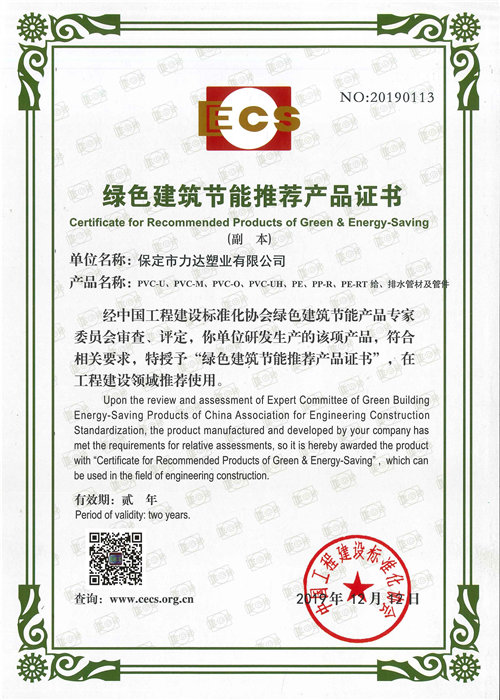ታኅሣ . 02, 2024 04:29 Back to list
High-Quality HDPE Pipes for Efficient Sprinkler Systems and Irrigation Solutions
Understanding HDPE Pipes for Sprinkler Systems
In today's agricultural and landscaping practices, efficient water management is paramount. One of the crucial components in any irrigation system is the selection of suitable piping. High-Density Polyethylene (HDPE) pipes have emerged as a popular choice for sprinkler irrigation systems due to their multitude of advantages.
What is HDPE?
High-Density Polyethylene (HDPE) is a thermoplastic polymer made from petroleum, recognized for its high strength-to-density ratio. This characteristic makes it an excellent choice for applications requiring durability and resilience. HDPE is widely used in various sectors, including agricultural irrigation, sewage systems, and many industrial applications. Its resistance to impact, corrosion, and chemicals makes HDPE pipes particularly advantageous for sprinkler systems.
Benefits of Using HDPE Pipes in Sprinkler Systems
1. Durability and Longevity HDPE pipes have a long lifespan, often exceeding 50 years with proper installation and maintenance. They can withstand extreme weather conditions and are not prone to rust or corrosion, which significantly reduce the need for frequent replacements.
2. Flexibility One of the notable properties of HDPE is its flexibility. This allows for the installation of piping systems in challenging terrain, accommodating bends and curves without the need for additional joints or fittings. This feature minimizes potential leakage points in the system, ensuring a more reliable water supply.
3. Resistance to Chemicals HDPE pipes are highly resistant to a wide range of chemicals, making them suitable for various agricultural applications where fertilizers and pesticides may be used. This feature ensures that the integrity of the pipe is maintained over time, preventing contamination of the water supply.
4. Leak-Free Joints HDPE pipes can be joined using heat fusion techniques, creating a joint that is as strong as the pipe itself. This leak-free system greatly enhances the efficiency of the irrigation setup, ensuring that water is delivered effectively to the intended areas without loss.
sprinkler hdpe pipe

5. Cost-Effectiveness Although the initial investment in HDPE piping might be higher than traditional materials, the long-term savings on maintenance and replacement costs make it a more economical choice. The reduced need for repairs and the durability of HDPE contribute to overall cost efficiency.
6. Environmental Sustainability HDPE is a recyclable material, contributing to environmental sustainability. As the agricultural industry moves towards more eco-friendly practices, the use of recyclable materials like HDPE aligns with the goal of reducing waste and minimizing environmental impact.
Installation Considerations
When installing HDPE pipes for a sprinkler system, it is essential to consider several factors. First, proper sizing is crucial to ensure optimal water flow and pressure throughout the system. It's important to analyze the specific irrigation requirements, including the type of crops or plants being irrigated and the overall size of the area.
Second, installation should comply with local regulations and standards. Consulting with professionals who specialize in irrigation design can help determine the best layout and pipe sizing for your specific application. Additionally, ensuring that the soil conditions and terrain are suitable for HDPE installation will contribute to the system's longevity and efficiency.
Maintenance of HDPE Piping Systems
While HDPE pipes are low-maintenance, regular inspections are recommended to identify any potential issues early on. Checking for signs of physical damage, such as dents or cracks, can help prevent future problems. Ensuring that the sprinkler heads are functioning correctly and that no blockages are present will also keep the system running smoothly.
Conclusion
In summary, the use of HDPE pipes in sprinkler irrigation systems presents numerous benefits, including durability, flexibility, and cost-effectiveness. As agriculture and landscaping continue to advance, the adoption of innovative materials like HDPE will play a vital role in enhancing irrigation efficiency and sustainability. With proper installation and maintenance, HDPE piping can revolutionize the way we manage water resources, ensuring that our plants receive the water they need while minimizing waste and environmental impact. Embracing this technology will ultimately lead to healthier crops, thriving landscapes, and a more sustainable agricultural future.
-
Durable PP Rigid Sheet: Lightweight, Chemical Resistant Solutions
NewsAug.21,2025
-
PVC Grey Sheet for Extraction: Chemical Resistant & Durable
NewsAug.19,2025
-
Durable PVC Pipe Fittings for Plumbing & Irrigation Needs
NewsAug.18,2025
-
HDPE Steel Belt Reinforced Spiral Corrugated Pipe | High Strength
NewsAug.17,2025
-
HDPE Pipe Fittings: Durable, Leak-Proof Solutions
NewsAug.16,2025
-
Premium CPVC Sheet: High-Temp & Chemical Resistant Solutions
NewsAug.15,2025

